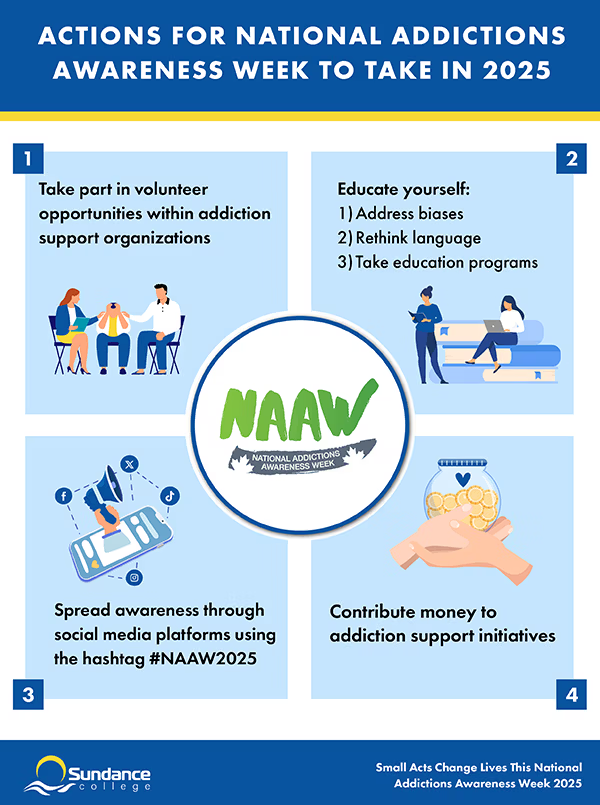Blog / Small Acts Change Lives This National Addictions Awareness Week 2025
Small Acts Change Lives This National Addictions Awareness Week 2025

Addictions and Community Health Professional Diploma
- Addictions Worker
- Youth Support Worker
- Family Support Worker
- Drop-in Centre Worker
Table of Contents
One in five Canadians will face problems with addiction at some point in their lives.
These aren’t just numbers; we can observe these challenges in people we see every day, perhaps someone’s dad, sister, wife, or son.
National Addictions Awareness Week (NAAW) 2025 takes place November 16 to 22, allowing us all to reflect on our personal responsibility to help others suffering from addiction.
It’s an opportunity to make a lasting impact on the life of someone in our community who needs it.
Let’s deepen our understanding of the complexities of addiction and explore how we can truly make a difference for those facing struggles.
Understanding Addiction and Dispelling Judgments
Addiction is not a lifestyle choice, but a disease. It often comes from life’s struggles like losing loved ones, family conflicts, domestic violence, job loss, or homelessness.
When we’re in pain, what do we naturally do? We try to find a quick way to ease the pain and feel better.
An important point to note: Our brains react the same way whether we’re eating chocolates, drinking alcohol, or using cannabis to find relief. Recent studies from Harvard Health show that some people are more likely to get addicted, no matter what the addiction is. So, if you eat a lot when you’re stressed, you express the same addiction pattern as someone using drugs.
Recognizing these similarities may help us realize that nobody is immune to addictions, so it’s time to put an end to judging. That’s the idea behind the online learning program Overcoming Stigma, led by the Canadian Centre on Substance Use and Addiction.
Building Supportive Communities of Hope
Addiction develops slowly through everyday choices, stressful moments, and the search for relief or belonging. But just as addiction can build over time, so can hope and healing. That’s why the theme of National Addictions Awareness Week 2025 is Anchoring Hope.
When someone recognizes they need help, the kind of support they turn to matters. Real recovery grows from connection and compassion, from communities that listen without judgment and offer understanding instead of shame.
NAAW 2025 reminds us that hope is something we can build together. By anchoring hope in care, empathy, and evidence-based support, we can help more people find stability, resilience, and the belief that healing is possible. Hope is a powerful thing.
Actions for National Addictions Awareness Week in 2025
Every year the Canadian Centre on Substance Use and Addiction (CCSA) prompts important conversations in its campaigns, providing an opportunity for everyone to learn, reflect, and take action.
In 2025, CCSA is sharing valuable resources that help us understand and eliminate stigma, reduce harm, address substance use in the workplace, and more.
Here is a list of activities you can participate in to actively engage in National Addictions Awareness Week and support someone dealing with substance abuse or mental health challenges:
- Take Part in Volunteer Opportunities: Explore volunteer opportunities within addiction support organizations. This hands-on involvement allows you to make a tangible impact, fostering a deeper understanding of the challenges high-risk populations face.
- Educate Yourself: Address biases and rethink language by immersing yourself in educational programs that provide a comprehensive understanding of addiction, fostering empathy and reducing judgment.
- Spread Awareness: Use social media platforms to share messages of support using the hashtag #NAAW2025 and visuals available on the CCSA website. By sharing information, you contribute to reducing stigma and promoting a more compassionate and informed society.
- Donate Generously: Consider contributing money to addiction support initiatives. Your gift provides valuable aid to those in need.

Choosing a Path of Impact – A Career in Addictions Counselling
If participating in NAAW activities feels fulfilling, consider taking your desire to help a step further. A career in addictions and mental health might be your calling. Many who have experienced addiction challenges, either personally or with someone close, find purpose in roles like addictions worker, youth care worker, or community outreach advocate , contributing meaningfully to the addiction and community health field.
Sundance College Addictions and Community Health Professional (ACHP) instructor Ana B. highlights the common thread among our ACHP students, saying:
“We hear the story so many times from our students who have been touched or seen firsthand people navigating the system, whether it’s detox or rehab, people in active use. A lot of our students are in an act of sobriety, wanting to give back because they’ve been there; they know what it’s like. It’s affected their brothers, uncles, sisters, or aunts firsthand. They want to learn about what drives them and then give back and work in this field.”
Before stepping into counselling practices, however, you need to equip yourself with proper mental health and substance abuse education. Choosing the right Addictions and Community Health Professional program is key to success. If you enter the field misinformed and unprepared, there is a risk of making inappropriate practices that can harm the client, a result opposite to your genuine intentions.
Creating Hope Beyond Awareness Week: Addictions & Community Health Careers
If you’re interested in starting a career in addictions counselling, Sundance College can help you develop the skills, knowledge, and resilience you need to enter this meaningful field. Here is what you can expect in our Addictions & Community Health Professional (ACHP) diploma program:
1. Personal Readiness: Preparing for Your Journey
Before starting classes, we help students feel personally ready to study topics that can hit close to home for many students. ACHP instructor Megan G., explains:
“We have criteria for how long students have to be sober before they go into this program. Many have been sober for years. We encourage students to build a support network and join self-help groups, support groups, and sponsorship programs. Having these things in place will help them complete the program, because there is the potential to be triggered.”
2. Program Highlights: Learning About Yourself And Others

The ACHP program isn’t just about theory. It’s your journey to self-discovery. Key highlights include:
- Psychology: Exploring psychology will help you better understand the intricacies of the human condition, biological factors, and thinking and development.
- High-Risk Populations: Understanding high-risk populations will shed light on the shame and stigma they face.
- Ethics in Addiction Counselling: This course will teach you about the ethical aspects of counselling, emphasizing maintaining high standards and focusing on the counsellor as a professional.
Megan. G also emphasizes hands-on practices of the program:
“Usually, we provide students with a case study or an example of a discussion question, and then ask the students to respond, ‘How would you deal with a client in this type of situation?’, or ‘How would you go about dealing with this crisis?’. Together, we unpack some of the choices that students make, whether it’s right or wrong, and what’s the why behind it, so they can move forward and go into the field knowing how to navigate that.”
3. Tips For Success In Addictions Counselling Program From Our Instructor
Spanning 44 weeks (about 10 months) with a 7-week practicum, Sundance College’s ACHP diploma program advantages include equipping you with knowledge, skills, and self-awareness essential for making a lasting impact in the addiction counselling field.
To help you successfully earn a diploma in Addictions and Community Health at Sundance College, Ana B. shares some practical advice:
“Sundance helps you succeed in this program and field by preparing you for challenging conversations. Strong time management skills, effective communication, and self-care are prioritized. Students are encouraged to check in with instructors regularly and to think critically. We also recommend an effective study routine, like mornings and nights, for better information retention during sleep.”
Be the Difference: Join Sundance College to Transform Lives
Across Canada, addiction issues are real. Events like National Addictions Awareness Week strive to draw the attention of both society and the government, but more is needed.
According to ACHP instructor Elizabeth M.:
“The opioid epidemic is ongoing. People continue to die at an alarming rate. We need a lot more support, funding, resources, detox beds, rehabilitation facilities, education, preventative care, and harm reduction programs.”
How can you help? With an Addictions and Community Health diploma from Sundance College, you can actively contribute to addressing this epidemic. Hands-on education with industry-experienced instructors will allow you to launch a career in addictions counselling and provide an opportunity to be a catalyst for change, advocating for mental health reforms.
Ready to be part of this transformation? Join Sundance College, where education works.
Fill in our contact form, and let’s talk about making a real impact together.
To learn more about how you can make a difference during National Addictions Awareness Week and beyond, watch insights from Sundance College’s Addictions and Community Health Professional diploma instructors.
Frequently Asked Questions (FAQs)
-
Why is National Addictions Awareness Week (NAAW) 2025 important?
Addiction is rampant in Canada, taking on many forms. The community impact is immense. Although we hear the stories every day, there’s still not enough being done. Stigmas and misconceptions persist. NAAW 2025 is an opportunity to spread awareness, reflect on the problem, and redouble our efforts to provide solutions.
The theme is Anchoring Hope. By spreading addictions awareness in Canada and providing non-judgmental support, we can supply just that: hope.
-
How can I make a positive difference during NAAW 2025?
Make a difference and change lives during National Addictions Awareness Week 2025 by donating money to addiction support initiatives. Educate yourself and seek to overcome bias and misconception. Volunteer for recovery and take part in addiction awareness actions. Finally, spread awareness online by using the hashtag #NAAW2025.
-
How can communities get involved in addiction awareness?
There are many community initiatives that promote addictions awareness. Community members could:
- Organize or attend awareness events such as community walks, recovery fairs, or candlelight vigils during NAAW.
- Partner with local organizations (health centres, schools, Indigenous groups, shelters) to host educational workshops or guest speakers.
- Promote addiction education through libraries, schools, and workplaces and share facts about prevention, recovery, and available supports.
- Encourage local media or social media campaigns that highlight recovery stories and stigma reduction.
- Support or volunteer with community outreach programs, harm-reduction initiatives, or peer-support networks.
- Advocate for accessible resources in your area, such as counselling, housing, or crisis services.
- Encourage youth engagement projects to promote healthy coping and early prevention.
- Collaborate with municipal leaders or health authorities to create or enhance addiction awareness policies and programs.
-
Where can I find trusted resources or ideas to help?
The Government of Canada offers a list of resources for those looking to get help with substance use.
The Canadian Centre on Substance Use and Addiction also offers resources, including publications and a social media tool kit for NAAW 2025.
Look for more resources by researching community support organizations in your area.
-
How can families support a loved one facing addiction?
Families can support a loved one by offering compassionate communication and by listening in a manner that is free of judgment. Focus on progress. They should be encouraged to seek professional recovery help. It’s important for families to practice healthy boundaries, staying connected while avoiding enabling. Families can better understand their loved one’s experience by learning about addiction and recovery. Finally, they can join family support groups and ensure that they aren’t neglecting their own wellbeing.
-
How can I keep promoting addiction awareness after NAAW 2025 ends?
Stay active with local community organizations that focus on addiction recovery, harm reduction, or mental health advocacy.
Volunteer after NAAW at outreach centres or recovery programs.
Share educational resources and recovery stories on social media to promote ongoing awareness.
Support or organize fundraisers and awareness campaigns.
Encourage workplaces, schools, or faith groups to prioritize ongoing addiction education.
Practice addiction recovery advocacy by pushing for policy improvements at all levels of government.
Use compassion and understanding in your everyday conversations to help reduce stigma year-round.
Make an impact by starting a career as an addictions and community health professional. Sundance College’s Addictions and Community Health Professional diploma program provides the right education for those looking to succeed in the field, preparing you for employment in less than a year, including a five-week practicum.
Related Blogs
Subscribe for more career advice
Blog Categories
Share on:
